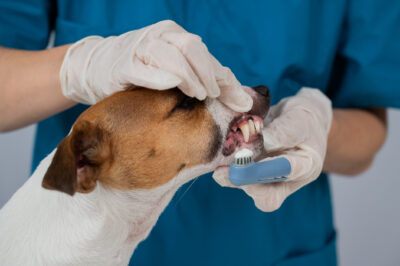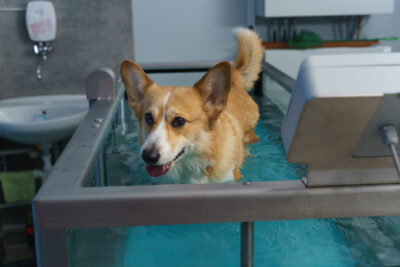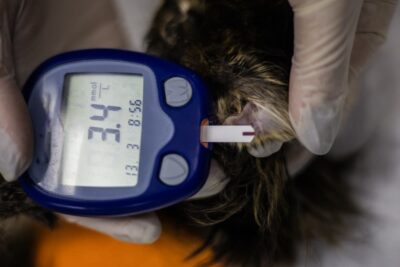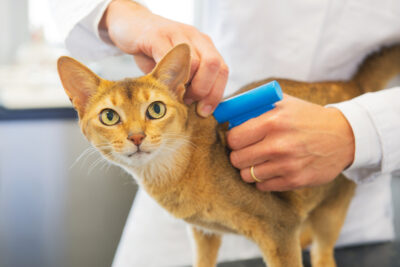Itch Relief for Dogs: Your Complete Guide

All featured products are chosen at the discretion of the GreatPetCare editorial team and do not reflect a direct endorsement by the author or reviewer.
We all know what it’s like to have itchy skin—and it’s not fun. So when our dogs are itching and scratching like crazy, we feel their pain. We’d do anything to get to the root of the problem and provide dog itch relief for our canine companions.
From infections to allergies, there are several problems that can cause itching in dogs (1). Let’s take a closer look some reasons your dog may be itchy, how skin issues are diagnosed, and natural ways to help provide itch relief for dogs.
Dog Itchy Skin Causes

“Just like people, there are an immense amount of issues that can cause itchy skin in dogs,” says Dr. Chris Menges, a small animal veterinarian in Texas. “Dogs’ skin and fur are the protective layer that helps protect them from the environment, and all sorts of creepy crawlies try to get on (and possibly onto you!).”
The three most common things that cause itchy skin in dogs are infections, allergies, and parasites, Dr. Menges says.
If you notice that your dog is scratching more than usual, one of these common causes of itching could be to blame:
- Dry skin, which can from nutritional deficiencies, mild dehydration, or low humidity in the environment
- Parasite hypersensitivity, most usually from fleas or mites
- Allergies (from either food or the environment, like pollen)
- Hot spots
- Hormonal issues
- Yeast infection (e.g., Malassezia dermatitis)
- Bacterial or yeast infection (e.g., staphylococcal pyoderma)
- Genetic disorder (depending on the breed, some dogs are more susceptible)
If your dog is scratching a specific spot on their body, it may mean the following:
- Itchy ears: Infections and allergies are common things that make your dog’s ears itch. Dirt and other materials can also cause irritation and discomfort inside your dog’s ears.
- Itchy paws: Paws are most commonly affected when a dog suffers from allergies to food, grass, or pollen. A dog may also have dirty paws or extra moisture on their paw pads, causing them to become itchy in that spot.
- Itchy butt: A dog’s bottom can become itchy for many different reasons. Fleas, ringworm, fecal contamination, allergies, or even impacted anal sacs are common culprits.
Your veterinarian can help identify what’s causing your dog’s itchy skin. “A trained veterinarian’s eye can quickly find the solution or recommend the testing needed to solve this issue,” Dr. Menges says. Keep a record of where, for how long, and any other factors around your dog’s scratching. When you talk to your vet, these observations can help form a quicker diagnosis.
Dog Itchy Skin Symptoms

Besides the obvious, here are some other signs that may signal a bigger problem than a passing itch:
- Relentless scratching in specific spots
- Constant biting, chewing (of paws), and licking
- Bleeding and redness
- A brownish red saliva stain on the fur
- A skin infection or irritation
- Scaling of the skin
- Odor
- Oozing pustules
- Hair loss
- Restlessness
Menges warns that while there may be a variety of causes for skin itchiness in dogs, the signs of itchy skin can all be the same. “These typically involve the dog repeatedly and consistently scratching at a specific place in the body,” Dr. Menges says.
Any such repetitive pattern from the scratching fits can lead to hair loss, reddened or darkened skin, foul odor, or bleeding. If you notice these signs, contact your veterinarian to ensure the problem doesn’t get worse.
Natural Canine Itch Relief: 5 Skin Soothers to Try
While there’s not a one-size-fits-all, “best” treatment for dog itching, these natural ingredients may help soothe your dog’s symptoms. Still, keep in mind that soothing the itch alone does not address the underlying cause of the itch.
Here are a few ingredients you can use to provide canine itch relief:
Honey

For centuries, honey has been prized for its potential health benefits and medicinal uses, ranging from healing wounds and burns to helping treat itchy skin issues like dandruff, psoriasis, and eczema (2). Known for its antioxidant, antimicrobial, and anti-inflammatory properties, honey is a common ingredient in pet skin and coat care products.
One honey in particular, manuka honey, offers ultra-potent antibacterial activity. This refined honey kills bacteria, maintains moisture, and helps the body shed dead tissue while protecting the skin’s natural microbiome (3, 4).
Colloidal Oatmeal

Colloidal oatmeal has long been used by humans to soothe dry, itchy or otherwise irritated skin, thanks to its antioxidant and anti-inflammatory properties (5). A high-quality oatmeal dog shampoo can help provide itch relief for dogs, moisturize skin, and soften your pup’s coat. Look for gentle, hypoallergenic formulas that are pH balanced and free of sulfates, colorants, and other harsh chemicals.
Apple Cider Vinegar

Apple cider vinegar (ACV) is a popular natural remedy that may also help dogs. An ACV bath or rinse can soothe itchy, flaky skin, restore pH balance, and fight microbes that cause irritation (6). However, it must be properly diluted and veterinarians recommend doing a spot test first to see how your dog reacts to it. If you don’t want to go the DIY route, you can always purchase an ACV rinse for dogs.
Fish Oil

Fish oil is packed with omega-3s, which can reduce inflammation and support your dog’s skin and coat health (7). Omega-3s can help dogs with allergies or sensitive skin that cause itching. A quality fish oil supplement may prevent flare-ups—just choose a trusted, third-party tested product and follow dosing instructions.
Turmeric

Turmeric is another natural ingredient that may support your dog’s healing. Its active compound, curcumin, may help reduce inflammation, ease swelling, and relieve pain (8). It can be administered topically to help ease itching, mixed into food, or taken as a supplement. Turmeric paste can help with chronic skin issues like lick granulomas, but it isn’t right for every dog. Check with your vet first, especially if your pet has health conditions or takes medication.
Itch Relief for Dogs: Other Tips and Advice

Recognizing the signs of skin problems in dogs is key, but these other steps are also important for itchy dog relief.
Understanding Allergies
If you think allergies are the cause, your vet can help identify the trigger and find the best treatment for dog itching. Medications are available to manage allergy-related itching including Apoquel, a common option that works within four hours.

Flea Prevention
Keeping your dog on monthly flea control will help stop those biting and itchy fleas dead in their tracks.
Eating Well
Dog foods that meet or exceed AAFCO standards “have appropriate nutrition to promote and create a healthy skin barrier to prevent infections,” Dr. Menges says. He also suggests giving your dog omega-3 fatty acids (like fish oil mentioned above) to help improve and decrease itchy signs due to allergies.
Regular Grooming
Keeping a regular grooming schedule and using high-quality shampoo products that are easy on the skin can go a long way. Make sure you’re not bathing your dog too often either. “Preventing itchy skin starts with every day help,” says Dr. Menges.
If you’re ever unsure about how to stop itching in dogs or what to give dogs for itching, talk to your veterinarian.









